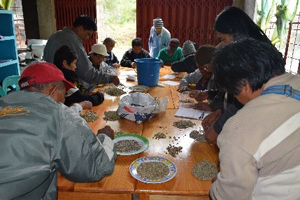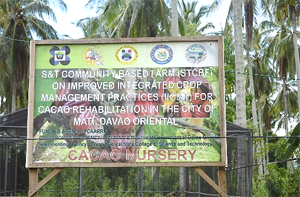 Science and Technology Community-Based Farm (STCBF), a technology transfer modality, is an expanded S&T-Based Farm that showcases the effectiveness of S&T interventions derived from R&D outputs of various institutions.
Science and Technology Community-Based Farm (STCBF), a technology transfer modality, is an expanded S&T-Based Farm that showcases the effectiveness of S&T interventions derived from R&D outputs of various institutions.
STCBF is a modality developed by the Philippine Council for Agriculture, Aquatic and Natural Resources Research and Development of the Department of Science and Technology (DOST-PCAARRD).
It aims to promote wider adoption of the recommended technologies and enhance active participation as well as empower the community, particularly local government units (LGUs) and community-based organizations in promoting the application of recommended technologies.
Interventions are based on the identified needs of the community. It is implemented by a group of farmers in an organization using their own resources as counterpart.
Led by a Magsasaka Siyentista (MS) or Community Leader (CL), beneficiaries of the STCBF include a cluster of 20 to 30 farmers.
Baseline information on farming practices and production economics of the cooperators are used to measure the success of the project including its diffusion to other farmers in the community or adjacent areas.
With STCBF, farmers benefit through wider adoption of appropriate S&T interventions, sustainable supply of quality farm products and raw materials that increase farm profitability, community empowerment, better supply chain, and improved partnership and linkages with other stakeholders.
 Techno-demonstration farm, capacity building, promotion and linkages, and IEC materials are the four components of the STCBF project.
Techno-demonstration farm, capacity building, promotion and linkages, and IEC materials are the four components of the STCBF project.
Projects on coffee, ornamentals (Chrysanthemum), bamboo, sea cucumber, seaweeds, dairy buffalo, mango, rice, tilapia, goat, banana, coconut, rubber, shrimp, abaca, jackfruit, cacao, and vegetables were completed in 12 different Regions.
Meanwhile, projects are still being conducted in Region 10 for cacao and Region 12 for rubber.
Newly approved projects on coffee, bamboo, and Falcata in Mindanao, as well as Gmelina in Luzon will soon be implemented.
